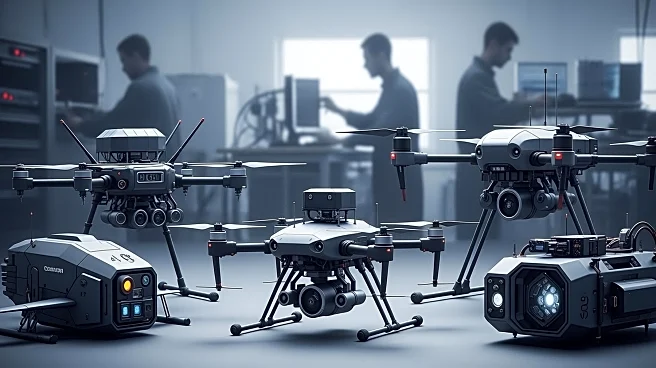What's Happening?
The defense industry is encountering significant challenges in scaling the production of counterdrone technology to meet potential threats. According to Col. Marc Pelini, who leads the Army’s air and missile defense cross-functional team, the industry is struggling
with industrial scaling due to delicate supply chains. This issue was highlighted during a counterdrone panel at the Association of the U.S. Army’s annual conference. Companies like Epirus, which manufactures high-powered microwave non-kinetic weapons, are particularly affected by supply chain constraints around high-powered amplifiers. Epirus CEO Andy Lowery emphasized the difficulty in preparing to scale production, noting the complexity of increasing output from seven systems to seventy. The company plans to expand its manufacturing capacity with a new facility and is leveraging its partnership with General Dynamics to double production capabilities. Established defense contractors are increasingly partnering with newer companies to meet production demands, as seen with Thales Defense & Security, Inc. stepping in to assist larger companies like Boeing and Viasat.
Why It's Important?
The ability to scale production of counterdrone technology is crucial for national security, as the demand for these systems is expected to rise significantly. The defense industry must adapt to rapidly evolving threats, such as the extensive use of drones in conflicts like those in Ukraine and Russia. The partnership between established contractors and newer companies is vital to overcoming production challenges and ensuring the military has access to necessary technology. This collaboration could lead to more efficient production processes and help non-traditional defense companies gain the experience needed to produce high quantities of military equipment. The Pentagon's encouragement of contracts with non-traditional companies highlights the importance of diversifying the defense industrial base to enhance innovation and responsiveness.
What's Next?
Epirus plans to announce the location of its new manufacturing facility by the summer of 2026, aiming to expand its production capacity. The company is also working with General Dynamics to increase output, focusing on metalwork and amplifier module production. As the demand for counterdrone technology grows, more partnerships between traditional and non-traditional defense companies are expected. These collaborations will be essential in meeting the military's needs and adapting to new threats. The defense industry will continue to explore ways to streamline production processes and integrate new technologies to maintain a competitive edge.
Beyond the Headlines
The challenges in scaling production of counterdrone technology highlight broader issues within the defense industry, such as the need for certified cost accounting systems and regular audits. These requirements add significant overhead for both government and industry, impacting profitability and efficiency. The push for partnerships with non-traditional companies may lead to a shift in how defense contracts are managed, potentially reducing bureaucratic hurdles and fostering innovation. This evolution could have long-term implications for the defense sector, influencing how new technologies are developed and deployed.
















